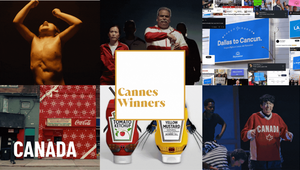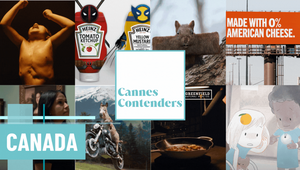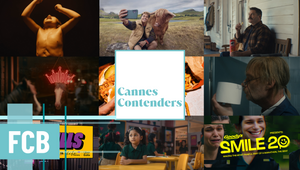
5 Minutes with… Nancy Crimi-Lamanna

Nancy Crimi-Lamanna may have been one of Canada's first ever interns before internship programs ever existed. She was fresh out of an advertising course, which she took partly on a whim with little prior knowledge that the writing of ads even existed, let alone as a career. Once her studies were over and her portfolio in check, she hit the street and offered to work at Toronto agency Bozell, Palmer, Bonner, which after months of working for free alongside a job at IBM, became her first official gig in adland.
Fast forward to now and Nancy has just been promoted to the chief creative officer of Canada for FCB (she was previously the co-CCO for FCB Toronto). Since she joined the agency in 2015, FCB Toronto has been named Canada's digital agency of the year for four years running. What's more, FCB Canada's work with the Canadian Down Syndrome Society has transformed a small organisation into a global expert in its field and led to lasting work that's actively empowering people with Down syndrome and their families.
LBB's Addison Capper caught up with Nancy about all that and lots more.
LBB> Congrats on the promotion! How is this nationwide role going to differ from the focus on Toronto? What are your main aims?
Nancy> There’s that saying that you have to be doing the role before you take the role, and in some ways I have been doing some of this national role across Toronto and Montreal. I’m responsible for a lot of the national clients so it’s natural for me to collaborate with the Montreal office. In some ways it’s not going to be that different in that respect but by adding Montreal now it’s official. That office is a priority for me, to try and make them famous. Toronto has done a great job and I’m going to try and use my contacts, resources and ability to elevate work to help them do that as well.
It’s not my approach at all to come in on a horse and rebuild. It’s more like saying, hey things are not going to change so much, I’m just going to be here more. Use me how you want and let’s work together to figure this out. I don’t pretend to be an expert in the Montreal market and therefore I look to them to bring that expertise. Learning from them as much as they’re learning from me is more my approach. So goal number one is to make Montreal feel like I’m a new employee and to use me as they see fit to help them be successful.
LBB> And you also work across all of North America too, right? What can you tell me about that process?
Nancy> We collaborate so closely [with FCB’s other offices]. A part of that has come through Susan [Credle, global CCO]. We have a Global Creative Council, we meet twice a year, and we’re friends. We collaborate, we’re hard on each other, we help each other make the work better and we don’t take any credit for it. It’s just a very generous spirit. We’d always collaborated that way so when we moved to this North American model - with Tyler [Turnbull, North American CEO] taking the helm there - it allowed us share and talk to each other more fluidly, such as with Andrés [Ordóñez] in Chicago, Gabriel [Schmitt] in New York and Karin [Onsager-Birch] in San Francisco, we already have a relationship. We work very collaboratively so when a new business pitch comes up across the North American offices we work together to pitch that piece of business using our resources across the offices. I’ve actually found it incredibly helpful during this Covid crisis. We’re trying to utilise our creatives across all the offices so we can protect as many jobs as possible so this fluid nature has been very helpful. If New York is down a team and needs help, we’re able to offer that help.
LBB> FCB Toronto has been named digital agency of the year four times in a row which is interesting for a full service ‘traditional’ agency. What do you think that says about the type of work that you try to nurture within your agency?
Nancy> Personally I don’t think there should be a separation. Every agency has to be digital. That’s become even more important during this period with the surge in e-comm and everybody being online and the amount of content being streamed. We identified that really early. Five years ago when I came into FCB we laser-focused our attention on being the best digital agency in Canada. That doesn’t mean we’re not a fully integrated agency but we felt that digital was going to help tell the most innovative stories as the world was changing. Our approach to creative is any idea that we haven’t seen before and gets us excited and connects with people in new ways, with the brand at the core. We look at creativity as an economic multiplier for brands. We tend to come in the door not very traditionally. We use strategy and a lot of data to identify the moments that can affect the maximum impact on a brand.
When we took on BMW for example, we realised that it does not have an awareness problem. If you’re looking for a luxury car, they’re on your list. And if they got people into the dealership their conversion rate was around 67%. What we realised, by using data and identifying where the hiccup was, it was really in search where they were dropping off. When people were comparing vehicles, BMW wasn’t really showing up. The questions people were asking weren’t being met with the right answers so people were falling off in the middle of that process. So that’s where we spent our money, and unlocking sales and driving growth for them in that moment. A TV campaign would have been the wrong thing to do. So that’s how we approach creative - looking at the journey, what’s happening along that journey, and where we can impact that journey the most. Clients don’t have unlimited dollars.
Stage Your Driveway is a good example, in trying to target luxury car drivers. They’re really hard to target. They consume media very differently, they don’t like to be talked to, they turn everything off. So how could we become part of their lives? To do that we created a new media channel by placing cars in the driveways of real estate listings - it’s that kind of thinking that just won us a Webby.
LBB> You touched upon it briefly but how is that approach to work aiding you and your clients at the moment? You mentioned the ‘journey’ - I guess that journey has changed somewhat!
Nancy> Yes. We’ve always been business partners with our clients but that’s been more important than ever through this, and in fact we had to really push hard in some instances where clients were hit harder. We had to have some uncomfortable conversations, saying you can’t do nothing, you must do something. You need to let people know you are open - it is as basic and fundamental as that. Some were there, others needed easing along, but those ones are really thankful now. We’ve had to really lead.
We are constantly reassessing data and looking at the journey because it’s changing constantly. Challenges are changing constantly so how do we address each challenge differently every single time? We’re also providing weekly updates on what’s happening in the world in their category. We have an airline, which has obviously been impacted heavily, so the way we work with them is a little different to the way we work with clients that were impacted less. Even though they’re pretty quiet right now we’re sending weekly trend updates, what other airlines are doing, competitive analysis, even though they haven’t asked for it. We’re just making sure that we’re being a good business partner to make sure that they’re set up for success once they come out of this. There’s lots of this thought leadership across clients but also across the network. All of the offices across IPG share information - which is kind of unheard of. McCann sharing with FCB, FCB sharing with MullenLowe. This is across categories; across travel, financial, retail. We learn from each other, share data from local markets, and talk about what we’re seeing in each category.
LBB> That’s interesting and refreshing to hear that you can really lean into that huge community that your agency is a part of.
Nancy> Oh, yes. I have a lot of love for independents but I have to say that right now I’m thrilled to be a part of IPG and that network. Maybe I wouldn’t feel the same if I was part of another holding company but I have to say that this is by far the most collaborative, not only across North America but across all of FCB, across all of IPG. It’s an incredible thing for our clients.
LBB> I read that you offered your copywriting services for free before interns were a thing. What inspired that idea? Did you attend advertising school?
Nancy> I wanted to be a journalist. I’ve been a bookworm my whole life and I wrote for the school paper. I didn’t end up going to journalism school but I did take literature with theatre in university - very helpful! - and I was struggling to figure out what I wanted to do. I found out about this advertising course at a local college here. I’d never heard of a copywriter, I didn’t know there were people that wrote the words in the ads I saw. I took this course, found out about copywriting and thought that I could do that. There were no formal portfolio courses at the time or any of that stuff. I finished the course, wanted to be a copywriter and I spent the summer putting my book together. It was horrible. I can’t draw, I’m a writer.
And I just hit the street, started talking to people, asking for contacts, and ended up at an independent agency here in Toronto called Bozell, Palmer, Bonner, which no longer exists. I said that I would work for free. There were no internship programs at the time - how could you turn down my offer? They took me on. I was working there everyday nine to five, then I would go to the job where I was making money, at IBM - I was doing customer service support for mainframes - and pull six to one there. And repeat. I got into a couple of little fender benders because I was a little sleepless! But it was so fun. I loved advertising. IBM wanted to hire me full time but I said absolutely not, I knew I’d get trapped into a job I didn’t love. I did that for three months, my own forced internship. They did pay for parking! Then they hired me freelance for a nominal amount of money for three months, then they hired me full time. I quit my job at IBM and never looked back.
LBB> What lessons did you learn at that time that have stayed with you through your career?
Nancy> Give it your all! I was singing and dancing for pitches, I was rapping. If you love it, throw yourself into it and it will pay itself back in dividends. I also think that a lot of people, when they first get into advertising, think that they will eventually leave advertising to do their real creative job - to be a dancer, writer or fine artist. I kind of felt the same, that I was doing this ‘for now’. But I finally said to myself, you know what, I love this. I committed myself, all in, there is no plan B, this is my plan A. That’s when my career took off. Managers can feel it, they can feel your passion for the business or not. They can feel your commitment to your craft or not. I decided that this is not shameful, this is my craft and I’m going to be really good at this. You have to be all-in if you want to succeed.
LBB> Do you think that advertising still has the appeal now that it did then to young talent?
Nancy> It’s hard because of the Googles and the Facebooks. I will say that it should. If you work at Google you’re very focused on that, if you work at Facebook you’re very focused on that. In advertising, I can do anything. I can do something experiential, I can do something brilliant on Google, I can use voice, I can be a real estate agent. The toolkit is unlimited and to me that’s really exciting. I find that if you go and work for some of these platforms then your toolkit becomes more limited as a creator. I would feel caged in, for me not to be able to let my mind imagine anything.
LBB> Is there one piece of work or project that you’re most proud of from over your career?
Nancy> This is a little predictable but the work for the Canadian Down Syndrome Society over the past four years has been the most rewarding both on a professional level and a personal level. They’re a tiny team of around 10 people and they have become the global voice and expert in their field. Seeing that has been incredible. The first year and this year’s campaign are probably the ones I’m most proud of because they’re leaving a legacy beyond bringing awareness. Down Syndrome Answers, even now it’s the top one to three in organic search, so any person that has a child diagnosed with Down syndrome and asks questions about it, those answers will be there with no paid media. And then Project Understood - making voice technology accessible for anyone is very gratifying. Hopefully when I look back in 20 years we’ll see the impact of what we started.
LBB> We keep seeing the term 'new normal’ with regards to the way that we work as an industry. How do you see that new normal? Out of the changes that you've seen recently, which do you think are here to stay for the foreseeable?
Nancy> One thing we’re seeing is people buying local, that’s become way more important to people. I think that’s driven by suspicion and concern of things coming in from other countries but I think it’s here to stay. We’ve also realised that we can do pretty much anything online, we can have pretty much anything delivered. We’re going to feel the impact of that across some of our retailers. Content has become far more important than it was before. Creating content rapidly at scale was important before and every agency is just figuring it out but I think we’ve just accelerated that. Price consciousness is going to go up so I think people are looking to brands to show how they’re providing value.
LBB> That trend of localism is a lovely thing, I think, and it’s something I try to do myself as much as possible. But it’s terrible news for big brands!
Nancy> They need to somehow figure out how to do the global and local thing at the same time. We’ve seen a lot of direct to consumer brands through this and they’ve always been really agile and really creative. For bigger brands, it’s about how to act like a direct to consumer brand because they’re creating relationships really quickly. Brands are also going to be looking at their e-comm platforms. The ones that had one working before are in great shape, whereas the ones that didn’t really exposed a lot of issues.
LBB> What's keeping you busy during lockdown? Any new hobbies?
Nancy> Well I have two kids. I’m doing a lot of cooking and cleaning in between meetings! I find myself craving the outside so I’m walking whenever I can. I’m walking the dog, cooking and cleaning!















